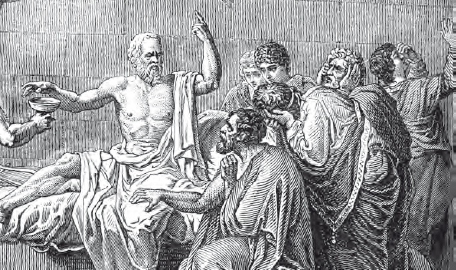Ancient PhilosophySocrates |
What are some key events for which Socrates is often remembered? |
Although Plato imports the character of Socrates into almost all of his dialogues, the early dialogues are considered to present a more accurate picture of the historical Socrates, who left no writings of his own. At one time, Socrates studied natural philosophy with Archelaus, who was a pupil of Anaxagoras (c. 500–428 B.C.E.). But by the time he took up philosophy in earnest Socrates’ main interests were in ethics. Unlike many Athenians, he claimed not to understand how ethics derived from religion.
In Plato’s Euthyphro, Socrates encounters the eponymous priest on the way to his own trial and asks him what piety is. Euthyphro responds that piety is what the gods love. Socrates asks him if piety is good because the gods love it, or if the gods love it because it is good. If something is good because the gods love it, then we need to know which gods to follow, because the gods often disagree. But if the gods love something because it is already good, then there must be a standard of goodness, or in this case, piety, which is separate from the gods. That means that the gods are not in themselves the source of morality. Euthyphro, of course, has no answer to this dilemma, and scurries away from Socrates.
In the Apology, Socrates taunts and baits the young prosecutor Meletus in a display of dialectic that is exactly what he is on trial for. He relates how he began talking to the experts in the arts and government to seek wisdom, but found that apart from their high birth, wealth, or respected positions, these experts knew less than he. Socrates swears that he has always served Athens, first as a soldier and then as a citizen concerned for the virtue of its youth. He avows his own belief in the approved gods and denies that he ever tried to introduce new gods.
The jury of 450 convict him with a majority of 30. Socrates has the right to make an alternative proposal to the death sentence. Voluntary exile would be an appropriate alternative, but instead Socrates suggests that he be given free meals in the Prytaneum for the rest of his life, in place of some charioteer (the charioteers were champion chariot drivers who had high status as popular heroes, as well as athletes.) The charioteers, Socrates says, only make people feel good, while he directly attends to their well-being. He also proposes first a fine of one mina, and then, at the insistence of his friends, 30 minae (still an absurdly small sum against a sentence of death). The court is not moved by Socrates’ counter proposal and the death sentence stands.
In the introduction to Plato’s Republic, Socrates sets up the purpose of this utopian work, by talking to a group of friends about the nature of justice. Here, Thrasymachus says that justice is whatever serves those in power. Socrates follows with a description of the psychology of a just person, but this does not answer the question of what justice itself is. Socrates then suggests that justice in individuals is difficult to define, but that insofar as the state is the individual “writ large,” it might be easier to understand what makes a state just and answer the question in that way. The Republic proper is Plato’s description of a just state.

